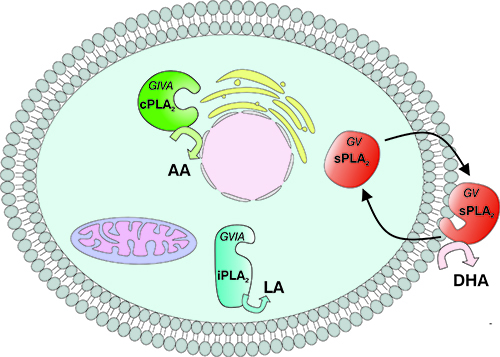How a Picky Enzyme Helps Fight Infection
July 16, 2024
Phospholipase A2 enzymes play a crucial role in our body's inflammatory immune response, acting as key players in a complex process that helps protect us from infections and injuries. These enzymes are like molecular scissors that cut specific fats, called phospholipids, found in our cell membranes.
When our immune system detects a threat, such as bacteria or virus, it triggers the activation of phospholipase A2 enzymes. These enzymes then breakdown phospholipids, releasing polyunsaturated fatty acids that are converted into important signaling molecules called eicosanoids. They serve as messengers, rallying other immune cells to the site of infection or injury, and this initiates inflammation.
 Inflammation is essential for fighting off invaders and promoting healing, but dysregulation of phospholipase A2 enzymes can lead to chronic inflammatory conditions like arthritis or asthma.
Inflammation is essential for fighting off invaders and promoting healing, but dysregulation of phospholipase A2 enzymes can lead to chronic inflammatory conditions like arthritis or asthma.
For the first time, researchers from the University of California San Diego have reported on the selectivity of these enzymes in macrophage cells, revealing new insights that might one day afford treatments for diseases.
Their findings appear in Science Direct.
This study was conducted by Gosia Murawska, a new postdoctoral researcher in the lab of Edward Dennis, Distinguished Professor of Chemistry and Biochemistry and
Distinguished Professor of Pharmacology.
“What surprised me the most about the study is that although lipids are found in abundance throughout the cell and resemble each other very closely, the enzymes display exquisite selectivity toward individual lipid substrates with very little overlap,” Murawska stated. “This allows the enzymes to work simultaneously, eliciting a finely tuned immune response.”
Funding for this study was provided by the National Institute of General Medical Science (R35 GM139641).
